(单词翻译:单击)
5.Personal Hygiene In The 18th Century Was Abysmal
5.十八世纪英格兰的个人卫生超级糟糕
Imagine living in a society where people routinely fart in public, blow their noses into their hands, spit indoors, and relieve themselves in front of company. Sound like something from an OCD nightmare? It's exactly what you'd experience if you took your first time-traveling vacation in 18th-century England.
想像在一个社会里,人们习惯性地在公共场合放屁和擤鼻涕、在室内随地吐痰、在别人面前随意大小便。听起来像强迫症的噩梦吗?如果你乘坐时光机回到十八世纪的英格兰,你会发现那些都是真的。
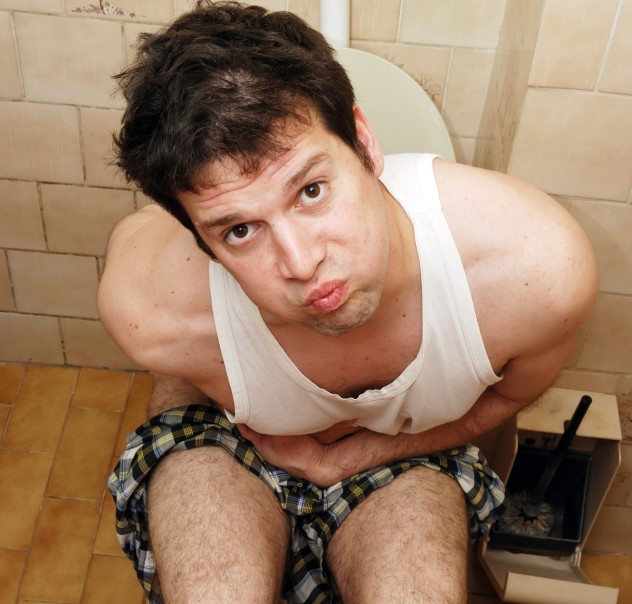
For most people, hygiene was nothing more than a fancy word they couldn't spell. The average man on the street had breath that could strip paint, and social niceties were unheard of. It was far from uncommon to eat a meal with your hands, wipe those hands down your shirt, and then fart loudly before spitting a wodge of mucus onto the floor. But what if you limited your journey to the homes of the upper classes? Sorry, but they were no better. While conversing after dinner, men would often pull out a chamber pot and relieve themselves in front of guests.Even if you spent your entire vacation avoiding other humans at all costs, you'd still encounter their disgusting by-products. Human waste was so prevalent that any food, water, or milk you could get hold of was probably contaminated in the grossest way possible.
对于大多数人来说,"卫生"只不过是一个他们都不会拼写的新奇词汇。街上的行人呼吸着比油漆味还要刺鼻的气味,社交礼仪这种东西更是闻所未闻。当你看到有人用手抓饭来吃,吃完饭直接把油擦到衣服上,然后在随地吐一口痰之前放一记响屁,千万不要感到惊奇。你在想如果把旅途设定在贵族的家中情况会不会好一些?对不起,答案是不会。在贵族的家里,男人在饭后交谈时会拿出便壶直接在客人面前解手。就算你使尽全身力气把自己与当时的人类隔绝,你也避免不了他们生活中的各种恶心的废物。在当时,人类的垃圾是如此猖狂,以至于任何能够接触到的食物、水、或牛奶都会以它们最脏的形象出现在你面前。
4.Ancient Mesopotamia Was Crawling With Pests
4.古美索不达米亚害虫满地爬
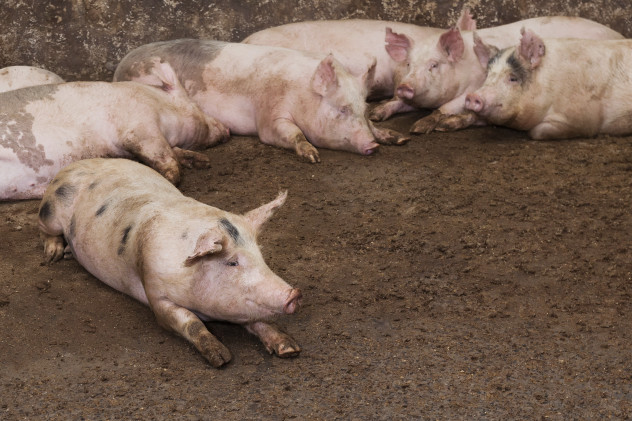
Like Pompeii and medieval London, ancient Mesopotamia had little in the way of waste disposal and sanitation. The inevitable result was pests on an enormous scale. Unlike in London or Pompeii, we know that feral animals were actually encouraged by the Mesopotamians. It turned out they had a part to play in society: garbage disposal.
跟庞培和中世纪伦敦一样,古代美索不达米亚在垃圾处理和卫生系统方面都不怎么样。那么不可避免的结果就是害虫泛滥成灾了。我们知道,跟庞培和伦敦不一样的是,美索不达米亚人是鼓励野生动物的。这样的结果就是野生动物成为了社会中重要的一员,垃圾处理工。
To deal with piles of refuse, cities across Mesopotamia allowed feral dogs and scavenging pigs to run the streets. We don't just mean in the outlying and poor districts. Teeth and bones collected by archaeological expeditions show these animals got absolutely everywhere. Under the Hittites, feral pigs were even encouraged inside the palace of the king.More disgustingly, the widespread nature of garbage also meant every centimeter of your typical Babylonian city was crawling with big fat rats, fleas, and other disease-carrying pests. As a result, infection by plague and a horrible, messy death was an ever-present worry, and this worry was compounded by the presence of nasty, food-borne parasites like trichinellosis.
为了处理大量垃圾,美索不达米亚各城市允许野狗和野猪在街上任意觅食。这种现象不仅仅出现在边缘的平穷地区。考古队从他们所收集的牙齿和骨头发现,这些动物遍布美索不达米亚。在希泰族,甚至连国王的皇宫内也养着野猪来处理垃圾。更恶心的是,满大街的垃圾意味着你所知道的每一个巴比伦城市都爬满了肥硕的老鼠、跳蚤和携带病菌的害虫。所以,在当时染上瘟疫和死亡的恐惧是一个长期存在的、困扰着人们的问题。而肮脏、食物滋生的寄生虫比如旋毛虫的存在则更加加深了这个隐患。
3.Georgians Stuffed Their Mouths With Dead People's Teeth
3.乔治亚人爱把死人的牙塞嘴里
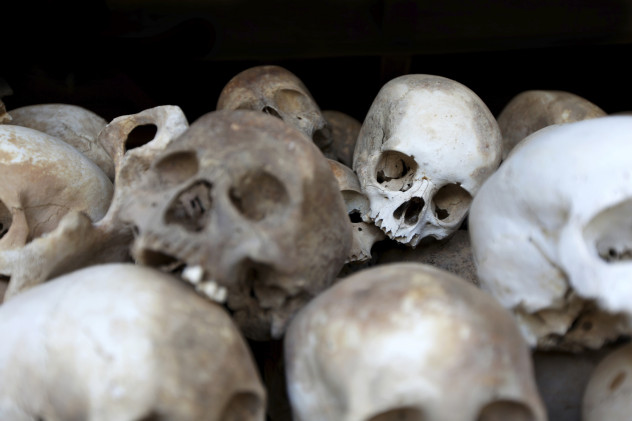
In 1815, two of the greatest armies on Earth met for the apocalyptic Battle of Waterloo, a bruising engagement that killed roughly 50,000 men. Aside from stopping Napoleon in his tracks and shaping European history, the battle had a strangely gross effect on one school of medicine: dentistry.
1815年,世界上两支最强的军队展开了灾难性的滑铁卢战争,造成了大约五万士兵的死亡。这场战争除了阻止拿破仑重建欧洲的进程,还有一个极其重大的影响,那就是医学中的牙医领域。
Prior to Waterloo, rotten teeth were one of the most feared ailments in British society. With no such thing as fillings or regular check-ups, bad teeth ruined many people's lives. But when the battle was over, Europe suddenly found itself in possession of thousands of young corpses—each with a mouth stuffed full of healthy teeth. What followed was one of the grossest booms in product history. Pieced together from dead men's jaws, dentures suddenly became widely available on the market. The Georgians went nuts for them. For decades, people willingly wore the smiles of men killed on the battlefield in place of their own. It wasn't until Claudius Ash began manufacturing porcelain teeth in the 1830s that this gruesome trend finally fell out of fashion.
在滑铁卢战争之前,烂牙是英国最可怕的疾病之一。因为没有补牙的材料及定期的牙齿检查,当时许多有烂牙的人都十分难受。滑铁卢战争结束后,欧洲人突然意识到许多战死的年轻士兵嘴里有他们需要的健康的牙齿。接踵而来的是制造业历史的一个繁荣阶段。自从将从死者内颌取出的假牙接合在一起后,其在市场上便广泛流通开来。乔治亚人简直都要疯了。接下来的好几十年人们都心甘情愿地用那些死在战场的士兵的牙替换自己本身的烂牙。这个奇怪的浪潮直到十八世纪三十年代克劳狄·艾什发明陶瓷牙之后才退去。
2.Toilet Paper Used To Be Horrifying
2.可怕的厕纸
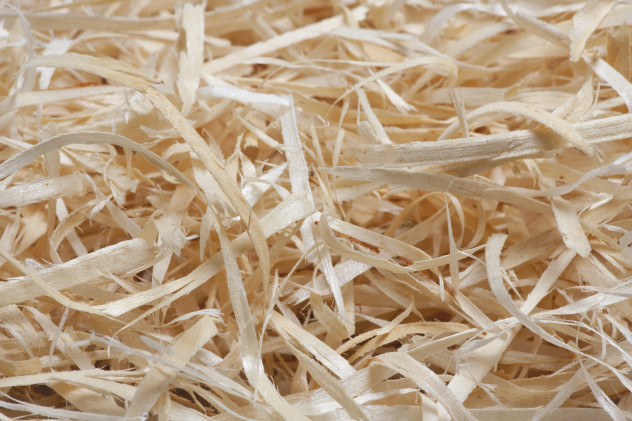
As people who probably grew up with indoor flushing toilets and paper marketed as "quilted" or "extra comfort," it can be hard to appreciate how difficult our ancestors had it. Go back less than 100 years and using the bathroom used to be downright unpleasant. One of the most general methods for wiping yourself was to use an old newspaper or catalog. The old Farmer's Almanac even came with a hole so it could be hung up in outhouses. Not that we can blame our grandparents for avoiding toilet paper. Until the 1930s, it was totally possible to buy paper that was full of splinters.
生活在一个有自动冲洗马桶和"柔软"、"超舒适"厕纸的时代,现在的人们也许很难理解古时候人们的心情。一百年以前,上厕所对人们来说是非常不舒服的。比如当时他们用的纸通常是旧报纸和杂志。老杂志《农夫年历》特意弄了个带洞的设计,好让它挂在厕所里。十九世纪三十年代之前,带夹子的厕纸是非常常见的。
In 1935, Northern Tissue (now Quilted Northern) made a killing advertising its toilet paper with the tagline "Splinter-Free!" The sheer success of the product shows us that even by the time FDR was in the White House, plenty of people were legitimately worried that wiping with the wrong paper would leave them sporting splinters in a very tender place. It's only in the last 80-odd years that companies have finally overcome this painful obstacle.
1935年,Northern Tissue(现在的Quilted Tissue)做了一个暴利厕纸广告,广告标语写着"Splinter-Free!"。该产品的成功表明,即使富兰克林·德兰诺·罗斯福在任期间,白宫里仍有许多人担心用错厕纸会使他们的菊花不舒服。在过去的80多年里,该公司才解决了这个问题。
1.Roman Toilets Were Terrifying
1.丧心病狂的罗马厕所
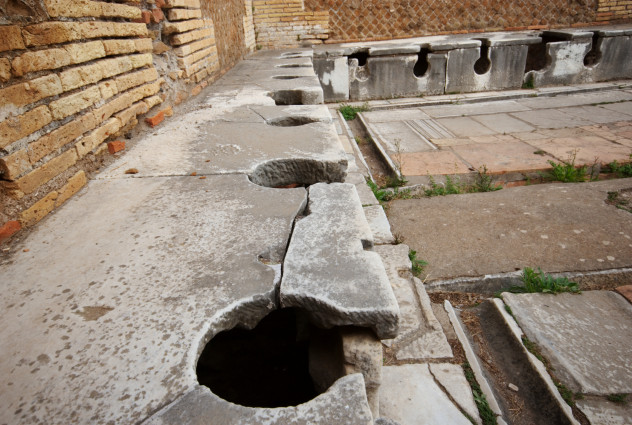
If you're one of the many people who has a thing about peeing in front of others, be glad you didn't live in ancient Rome. Back then, the words "public restroom" were taken very literally. Up to 50 people would sit in a circle doing their business in plain view of one another and, when they were finished, wipe themselves on a communal sponge as dirty and disease-ridden as, well, a shared butt-wiper. Sound like the worst toilet experience you can imagine? We're only just getting started.
如果你是众多对公众场合小便心有余悸的人之一,就该庆幸你没有生活在古代罗马。那时候,公众厕所就真是公众的。厕所里,至少五十个人围成一个圈,每个人上厕所的时候都一览无余;完事后,他们再把脏兮兮甚至带着病菌的公共海绵当作厕纸使用。听起来像是你能够想象到的最可怕的厕所经历?我们才刚刚开始变得有点恐怖而已。
Although Roman sewers were advanced for the time, they were woefully inadequate by our standards. With no U-bend to speak of, toilets opened directly into dark drainage channels through which insects and what Discover Magazine calls "biting creatures" frequently emerged. Thanks to the buildup of methane, it was also totally possible for jets of naked flame to suddenly explode out the holes. This made the simple act of going to the toilet like playing the worst version of Russian roulette imaginable. Unsurprisingly, all this nastiness made the average Roman very wary of the toilet. Archaeological excavations have uncovered magic spells scrawled on bathroom walls to ward off demons and images of the goddess Fortuna designed to bring good luck. When your trip to the restroom could result in your ass getting bitten or badly burned, you probably need all the luck you could get.
虽然罗马的下水道是当时最先进的,但跟我们现代的下水道系统相比,简直就是差太多。没有"U"型弯头,厕所直接连通滋生昆虫和《发现杂志》称做咬人生物的排水渠。由于沼气的堆积,时不时会有明火从排水渠喷射出来。这使得人们上一趟厕所就跟玩最险的一局俄罗斯轮盘赌一样。毫无疑问的,这些会引起疾病的脏东西使罗马人对待厕所非常谨慎。考古挖掘家在古罗马厕所里发现用来抵御恶魔的神秘符咒和幸运女神福尔图娜的神像。当一个人上一趟厕所屁股都会被虫咬或被火烧的时候,他大概需要一整个世界的幸运。
翻译:哈利小王子 来源:前十网


